#Settlers of Exile
Explore tagged Tumblr posts
Video
youtube
Path of Exile | Settlers of Kalguur | Episode 3: Mercy Mission
0 notes
Text
Slavery's Exiles - the story of the American Maroons

The forgotten stories of America maroons―wilderness settlers evading discovery after escaping slavery Over more than two centuries men, women, and children escaped from slavery to make the Southern wilderness their home. They hid in the mountains of Virginia and the low swamps of South Carolina; they stayed in the neighborhood or paddled their way to secluded places; they buried themselves underground or built comfortable settlements. Known as maroons, they lived on their own or set up communities in swamps or other areas where they were not likely to be discovered. Although well-known, feared, celebrated or demonized at the time, the maroons whose stories are the subject of this book have been forgotten, overlooked by academic research that has focused on the Caribbean and Latin America. Who the American maroons were, what led them to choose this way of life over alternatives, what forms of marronage they created, what their individual and collective lives were like, how they organized themselves to survive, and how their particular story fits into the larger narrative of slave resistance are questions that this book seeks to answer. To survive, the American maroons reinvented themselves, defied slave society, enforced their own definition of freedom and dared create their own alternative to what the country had delineated as being black men and women’s proper place. Audacious, self-confident, autonomous, sometimes self-sufficient, always self-governing; their very existence was a repudiation of the basic tenets of slavery.
Amazon has this book and they want a fortune for it

FEEL FREE TO DOWNLOAD IT FROM THE BLACK TRUEBRARY FOR FREE - Click HERE TO DOWNLOAD FOR FREE
#Slaverys Exiles - the story of the American Maroons#The forgotten stories of America maroons―wilderness settlers evading discovery after escaping slavery#MARONAGE#maroons#american slavery#runaways#Black Free Communities#Rebellion#anti slavery
29 notes
·
View notes
Text
But Zionists sought sovereignty over a land where other people lived. Their ambitions required not only the dispossession and removal of Palestinians in 1948 but also their forced exile, juridical erasure and denial that they ever existed.
Marc Lamont Hill, Except for Palestine: The Limits of Progressive Politics, February 16, 2021
#marc lamont hill#dispossession#palestine#ethnic cleansing#settler colonialism#dark academia#nonfiction#light academia#gaza#quotes#history#exile#spilled ink#words words words#human rights
47 notes
·
View notes
Text
[with resignation in my heart] fine I will join fubgun's discord server
2 notes
·
View notes
Text
Expansão Path of Exile: Settlers of Kalguur recebe mais detalhes
Durante a transmissão online “GGG Live”, a desenvolvedora Grinding Gear Games, responsável por Path of Exile, revelou detalhes sobre a atualização 3.25 do jogo, Settlers of Kalguur. A expansão, que será lançada ainda neste mês, vai adicionar ao título novidades como a Challenge League, melhorias no balanceamento, incluindo duas classes de Ascensão, melhorias no Endgame, adições a campanha e uma…
3 notes
·
View notes
Text
Last Epoch Season 2 Delayed - This morning I talk about the Last Epoch Season 2 delay, some more Phrecia nonsense, and plugging forward in Kaiju: Battlefield Surgeon.
#arpg#Last Epoch#legacy of phrecia#mappers#MMO#MMORPG#path of exile#Path of Exile II#poe#POE1#POE2#season 2#Settlers of Kalguur
0 notes
Text
Suvğa tayanma, rusqa inanma (don't lean on water, don't rely on a Russian)


On the 80th Anniversary of the Genocide of the Crimean Tatars, I want to share both contemporary stories of continued tribute to Russian crimes from political prisoner pow and the family's memories of Crimean Tatars who chose to serve in the Armed Forces.
As part of the Letters to a Free Crimea initiative, @ DariiaAstafieva read a letter from Halyna Dovhopola, a native of Crimea and a pensioner who was illegally detained by Russia in November 2019 and accused of alleged "high treason."
— On March 24, they tried to break three middle fingers on my right hand. I have strong bones and have never had any fractures, but the swelling, bruising, and wild pain ensured that I would be in pain for two weeks. It was the day of the first trial verdict. Whether it was a coincidence or it was planned, on that day the convoys treated me worse than the Gestapo: they threw me in and out of the car, shouted, and cursed. In addition to three swollen fingers, I had crimson bruises on both hands, and I was laughing in their faces - 12 years in prison! For six months I tried not to imagine my abandoned house and yard. I would start thinking about my children and grandchildren, and after a few minutes, I would order myself not to touch the bare wires. It worked. It was only when I didn't hear from my son for a long time that I panicked and worked myself up. I lived mostly with the thought that one day I would return to Kyiv and that my Facebook friends would be happy to see me and write nice messages. And I would be happy for each of them, I would joke and laugh, and everyone would be surprised by me.


To mark the 80th anniversary of the deportation of the Crimean Tatar people, Isa Akayev, commander of the Crimea special forces, tells the story of his family's deportation and his motivation to resist the occupiers with arms.
Read the first story from the special project "Qarşılıq / Resistance" in the thread. I was born in Uzbekistan. In deportation.
I spent my childhood in the area where Russians deported not only Crimean Tatars, but also Koreans, Germans, Poles, Czechs, and dekulakized Ukrainians. Growing up, I saw with my own eyes what Russia was doing to other people. My grandmother always told me that we must return to Crimea because it is our home.
"If we do not return there, we will simply disappear. Remember that a people without land dissolves. The strength of the people comes from the land," my grandmother told me. Although I was born and raised in exile, I always remembered where my real home was and where I came from. I remember that before the deportation, my father's family lived in the village of Mamashay, which the Russians renamed Orlovka. I knew that my mother was a purebred Nogai and that her family came from the village of Akshaykh, although the Russians called it Razdolnoye. I would like Crimea to become the way my ancestors knew it. I want the Crimean Tatar language to be heard there and our culture to flourish. I want to do everything in my power to make Crimea a center of development, not decline, as the Russians have made it. Because we grew out of this land. We are children of this land.
And that is why we will definitely liberate Crimea from the occupiers. That is why we will definitely return home.
This is what I am fighting for.

On the 80th anniversary of the deportation of the Crimean Tatar people, a soldier of the 24th Brigade with the call sign "Turk" tells the story of his family, which was criminally deported by the Soviet authorities in 1944. "There are five children in our family, and my brother and I have three older sisters. My father always wanted a son, but he got two at once. Me and my brother.
And if not for the Russians, we would not have been the only twins in our family. Our grandmother was pregnant when the Russians broke into the young couple's house and forced them to pack their belongings in a hurry. Like everyone else, they were given little time to grab at least the most necessities. Some food, documents, and a Koran. When we were young, my grandmother told us about all the horrors they had to endure. My grandmother's first husband did not survive the journey. Shortly after arriving at the deportation center, her brother died due to the terrible conditions of detention, and my grandmother learned that she was carrying twins under her heart. She also lost them. My brother and I were born half a century after these events, but we have not forgotten the crimes committed by the Russians against our people and our family. And we will never forget. I will not forget my grandmother's eyes when she talked about the house stolen by the Russians, and about the children she lost. I will not forget those long hours of waiting for the evacuation of my severely wounded brother, who was bleeding in my arms. I will not forget and I will continue to fight. Because I have only one path.
And this is the way to the liberated Crimea, to the liberated home."

On the 80th anniversary of the deportation of the Crimean Tatar people, a serviceman of the 112th separate motorized rifle brigade "Tataryn" @ ant_etkenmen tells the story of his family's deportation in 1944 and his motivation to fight for the liberation of Crimea. "The most important lesson I learned from my grandmother is that you shouldn't trust Russians. Never.
She always repeated an old Crimean Tatar proverb: "suvğa tayanma, rusqa inanma (don't lean on water, don't rely on a Russian)". Bita said that shortly before the deportation, which was later organized by the Soviet authorities, freight cars were brought to the station in Karasubazar, where our family lived at the time, which was in poor condition and needed repair. The authorities rounded up able-bodied Crimean Tatars to fix the cars. It was allegedly done for the needs of the army. But within a day and a half, the same railroad cars that the Crimean Tatars were repairing became graves for many of them. Since childhood, I have been taught to study the history of my people, and that is how I learned that the 1944 deportation was not the only one, but only "one of the" ones. Moreover, my father always emphasized that one should also study the history of one's enemy because this is the only way to defeat them. So I also studied the history of Russia. Every year, my parents took me with them to rallies dedicated to the events of May 18, the date of the deportation of the Crimean Tatar people, so that I would never forget what our people went through. And the older I got, the more my parents and I discussed each rally in detail. But my grandmother's stories about the deportation were usually short - she would start crying, and because of her tears, she could not continue every time. I learned from my father that my grandmother was deported to the Urals, and from there they eventually managed to move to Uzbekistan (this was allowed for families of professional workers). And later, more than half a century later, Bita was able to return to Crimea from the places of deportation. When I was a kid, I was surprised that Bita, when talking about the deportation, started crying almost immediately, and when she mentioned the war, she held on a little longer and managed to tell more.
Now I realize that she met and experienced the war and the German occupation at home."

On the 80th anniversary of the deportation of the Crimean Tatar people, Asan Isenadzhiev @ dr_livese tells the story of his family, who were criminally deported by the Soviet authorities in 1944. "My grandfather told a story about the deportation that I remember very well. While they were being forced into a freight train, a little girl fell out of the carriage. The Russians set dogs on her.
No one chased the dogs away… This all happened in front of my grandfather, who was still a child. I also had to see similar events live. With a difference of 78 years. Again on May 18. And again because of the Russians. The captivity in Taganrog was hell. And there I often thought about our history. My family had gone through many trials. I remembered what my grandparents, great-grandparents, and great-great-grandparents had gone through, and I told myself that I had to be worthy of it. My great-grandfather went through the Second World War, reached Cologne, was wounded, returned to the war, and then there was deportation… But despite everything, they survived.
So I had to go through all the trials and survive. Despite everything, my family returned to their native Crimea.
Similarly, one day I want to walk the streets of Bakhchisarai again, see the Dzhur-Dzhur waterfall, and the Angarsk Pass, and climb Demerdzhi. I want to feel at home again."

To mark the 80th anniversary of the deportation of the Crimean Tatar people, a veteran of the 24th Brigade with the call sign "Lancer" tells the story of his family, which was criminally deported by the Soviet authorities in 1944. I was born in deportation, but I don't remember anything from there. For me, Uzbekistan is just an entry in my birth certificate, my home has always been Crimea. When my brother and I were two years old, our family - parents, grandmother, and five children - returned from the places of deportation. My parents tried very hard to provide us with a happy childhood, despite the lack of money, the difficulties, and the need to build a house and our entire life from scratch. We were on our land. We were at home.
In 2014, our sense of home was taken away from us again. My father foresaw this because he warned us that we could not trust the Russians, absolutely all russians.
I didn't understand much as a kid, but I felt the silent contempt with which the Russians generously "bestowed" on us.
They always behaved as if we, the Crimean Tatars, were strangers in Crimea, and they, on the contrary, were the masters. And even so, I still could not fully believe that Russia would encroach on the territory of Ukraine, and would allow itself to break into someone else's home like that.
But they did. And after 2014, I learned my father's lesson forever - you can't trust Russians. That's why my brother and I did not hesitate to take up arms when the Russians started a full-scale war against Ukraine. Because there was no other way. We had to defend our homeland, we had to liberate our native Crimea. With the same thoughts, I went on one of the combat missions during the counteroffensive in the Kherson region. Then a tank drove at us. Two of my comrades were killed immediately, and two more did not wait for evacuation. My arm was almost torn off. My brother was next to me, and it gave me confidence and peace of mind. "I will make it. I will make it," I kept repeating these words to myself for seven long hours while waiting for the evacuation.
And I did. I made it."


"Once it was the Palace in the Gardens, Bakhchisarai. And then the Russians came. The modern appearance of the Khansaray".
That represents what russian culture is doing to anything that it can reach.


You can help by supporting the fundraising for the Crimea battalion.

#Qırım#crimea#Qırımlı#crimean tatars#Sürgünlik#exile#80th Anniversary of the Genocide of the Crimean Tatars#genocide#stop the genocide#russia is a terrorist state#russian invasion of ukraine#russo ukrainian war#russia#russian colonialism#settler colonialism#ukraine#world#history#stand with ukraine#standwithukraine#arm ukraine#український tumblr#український тамблер#video#long reads#donate if you can#donations#please donate#important#signal boost
1 note
·
View note
Note
Killing 1300+ Jews in barbaric ways does not make you the good guys. Israel retaliating is Hamas’ fault. Hamas surrendering would mean peace. Israel surrendering would have more dead Jews. But i guess that’s the end goal.
No, we're always the barbaric terrorists. Israel is the good guy for killing 9,000+ Gazans the past 25 days, and trapping 1,000+ under the rubble which will definitely turn out dead if they ever get the proper equipment to lift it off them. Israel is the good guy for killing Shireen Abu Akleh. Israel is the good guy for killing Ahmed Erekat. Israel is the good guy for killing Nadim Nuwarah and Mohammed Salameh. Israel is the good guy for opening fire on 2,400 protesters and killing 52. Israel is the good guy for holding over 1,000 Palestinians as "administrative detainees," meaning they are held indefinitely without charges.
In fact, Israel has been the good guy ever since they got the British to help them colonize Palestine and get rid of the Arabs, as they admitted to wanting it themselves. After all, as Winston Churchill said himself, the colonization of Palestine was righteous because as the Red Indians of America, and the black people of Australia, "a stronger race, a higher grade race, or, at any rate, a more worldly-wise race, to put it that way, has come in and taken their place."
Palestinians, be it on Gaza or the West Bank, can never retaliate or defend themselves. We're to either die and be violated quietly or we are terrorists which will be gleefully eradicated with the help of every colony-based State in the world. Otherwise, we'll disturb the comfortable privilege your racism and religious intolerance ensures.
When Hamas didn't existed the occupation began and the British violently suppressed anyone who opposed. When Hamas didn't exist the Nakba happened. When Hamas didn't exist the Deir Yassin massacre happened. But, you know, that one's fine because it happened after Israel had made Palestine agree to a peace pact, and they would never act unfairly so the brutal murder of over 100 Palestinians is obviously being misunderstood. Hamas doesn't operate in the West Bank, but they're still expelled from their homes, brutalized and murdered. Since October 7, West Bank had 115 killed, more than 2,000 injured and nearly 1,000 others forcibly displaced from their homes because of violence and intimidation by Israeli forces and settlers. They'll bomb mosques with exit points created to save people from settlers' violence, then claim they were used for terrorism. Proof? They don't need it. They'll bomb first then ask questions later.
Do people who blindly defend Israel do anything other than victimize yourselves? Do you even read any actual Israeli news that said the IDF "shell[ed] houses on their occupants," because they're too incompetent to do anything other than bombing everything? Do you ever wonder why the people Israel swears were burned and beheaded always came from reports from houses absolutely destroyed by what could only be shelling? Do you ever hear testimonies from survivors of the massacre saying IDF shoot at their own civilians? Do you ever read about past al-Qassam attacks and noticed they've never had mass casualties because IDF never responded like this? Do you even know what al-Qassam is or do you live to regurgitate whatever you're fed and being spoon-fed your information?
If Hamas' militia surrenders, Gaza will be wiped out and Gazans — those who are not murdered — will be exiled into Egypt's Sinai. That's the end goal since 1948, and that's what you're defending. But who cares? Arab blood is cheaper and racism is always fashionable.
#gaza#free gaza#free palestine#palestine#israel is a colonial project whose sole purpose is erradicating palestine#west bank#free west bank
5K notes
·
View notes
Video
youtube
Path of Exile | Settlers of Kalguur | Episode 72: The Mother of Spiders
#youtube#Path of Exile#Settlers of Kalguur#Episode 72#The Mother of Spiders#Gameplay#Walkthrough#Let's Play
0 notes
Text
This article by Mohammed El-Kurd is from last month (Sept 2023) but good nonethless.
"Here is where I stand. There is a Jew who lives–by force—in half of my home in Jerusalem, and he does so by “divine decree.” Many others reside—by force—in Palestinian houses, while their owners linger in refugee camps. It isn’t my fault that they are Jewish. I have zero interest in memorizing or apologizing for centuries-old tropes created by Europeans, or in giving semantics more heft than they warrant, chiefly when millions of us confront real, tangible oppression, living behind cement walls, or under siege, or in exile, and living with woes too expansive to summarize. I’m tired of the impulse to preemptively distance myself from something of which I am not guilty, and particularly tired of the assumption that I’m inherently bigoted."
1K notes
·
View notes
Text
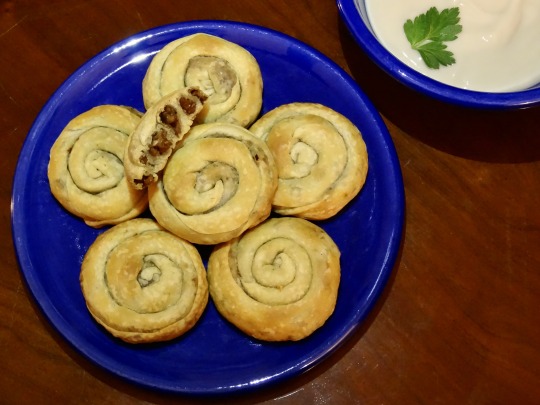
[ID: A group of pastry pinwheels on a blue plate next to a bowl of yoghurt garnished with parsley. End ID]
صفيحة يافاوية / Safiha yafawiyya (Yaffan pinwheels)
The dish
صَفِيحَة يَافَاوِيَّة ("ṣafīḥa yāfāwīyya") is a type of safiha, or flatbread, believed to have originated in the coastal city of يافا (yāfā; "Yaffa," sometimes "Jaffa"). While other versions of safiha consist of a flat piece of dough topped with meat, Yaffan safiha are made by rolling dough out to a transparent thinness, folding it to enclose a filling of meat or spinach, and then whirling it around into a pinwheel shape. More highly valued in Yaffa than flat safiha, Yaffan safiha inspires proprietary feelings amongst residents and emigrants. The technique has, however, spread to other areas in Palestine, as well as to Alexandria, Egypt, where a large number of Yaffan exiles have resettled.
Yaffan safiha may also be called "حواية" ("ḥawāya"), after a kind of towel that is stitched into a spiral and placed on top of the head to cushion it while carrying jugs of water, or trays that are hot from the oven. One Yaffan woman remembers her mother assembling these pastries at home and then bringing them, in a large copper tray, to the baker, so they could be cooked in a shared oven for a small fee. The baker's wife would have to wait to use the oven another day. The usage of communal ovens by those who do not have an oven in their home is still common practice in rural areas of Palestine.
Traditionally, the dough used to make Yaffan safiha includes only flour, salt, oil, and water. Some modern Palestinian recipes leaven the dough with baking powder; or include milk powder as a way to use food aid from NGOs, which seek to alleviate the effects of the Israeli occupation's extreme restriction of transport, travel, and agricultural activities on Palestinians' diets. With a spinach filling and without milk powder, the safa'ih may be described as "صيامي" ("ṣiyāmī): a word derived from "صِيَام" ("ṣiyām"; "fast") but which, due to the abstention from meat mandated during the Lenten fast, is colloquially used to mean "vegetarian."
Golden brown and fragrant with olive oil, these safa'ih combine layers of crisp, flaky dough with a savory, well-spiced filling. Recipes for both a 'meat' and a spinach filling are provided. A side of yoghurt and a garnish of mint round out the flavors of the filling and add tanginess and textural contrast.
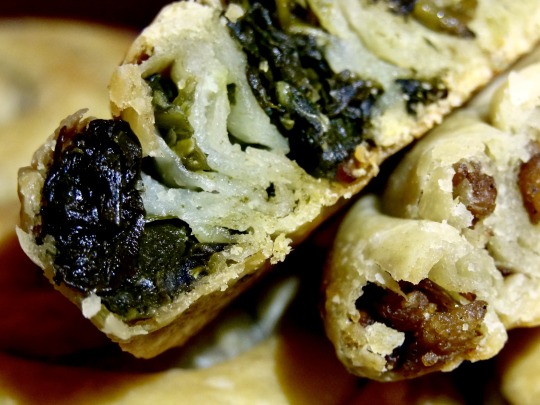
[ID: Close-up of two pinwheels cut open to reveal a spinach filling and a 'meat' filling between thin layers of pastry. End ID]
The Bride of Palestine
Yaffa is a port city with an ancient history which, until the 20th century, was the largest Arab city in, and the cultural and economic capital of, Palestine. For this reason it has sometimes been called عروس" "فلسطين ("'arūs filasṭīn"); "The Bride of Palestine." With the 1909 founding of the nearby Tel Aviv, Yaffa began to be considered its "twin" or "sister" ("האחיות") city; it had a distinctly Arab character where Tel Aviv was almost entirely Jewish. Yaffa was thus considered in disctinctly racialized terms: both attraction and threat; a source of authentic rootedness in the land which could be tapped, but also a potentially contagious bastion of Oriental "weak[ness]" ("חליש").
Yaffa had been a popular destination for culinary tourism in Mandate Palestine, with young settlers heading to the seaside to escape from religious studies and religious dietary restrictions—associated with diaspora Judaism and a lack of connection to a homeland—and to eat earthier Arab foods such as hummus, falafel, kebab, and ful.
In 1948, Zionist paramilitary organization Irgun dropped several tons of British bombs on major civilian areas of Yaffa in order to overwhelm resistance and empty the city of its Arab population; they destroyed the much of the Old City in the process. The neighborhood of المنشية (Manshiya) was destroyed shortly thereafter. Beginning in December of 1948, Yaffa was, part by part, annexed to Tel Aviv.
Today, despite the annexation and the Hebraization of the street signs, Yaffa maintains an Arab character in popular discourse. The call to prayer is heard in the streets, and the أبو العافي (Abulafia) bakery and أبو حسن (Abu Hassan) hummus restaurant and remain where they have been since the 1760s and 1970s, respectively. But increasing gentrification, rising rent prices, cafes and restaurants which cater to tourists and settlers, and the construction of Jewish-only residential projects threaten to continue the ethnic cleansing of the ancient city.
Yaffan Cuisine
Israeli occupation has tended to collapse some of the regional distinctions within Palestinian cuisine, as Palestinians are forced into exile or else crowded into Gaza and into smaller and smaller enclaves within the West Bank. Some dishes, however, still have variations that are associated with particular cities. Stuffed red carrots (محشي الجزر الأحمر; "maḥshi al-jazar al-'aḥmar"), cored and filled with rice and spiced meat, are a dish common throughout Palestine but cooked differently everywhere: in a sauce of lemon juice, pomegranate molasses, and red tahina in Gaza; in tamarind paste in Al-Quds and Ramallah; and in orange juice in the orange-rich Yaffa region. Abu Hassan restaurant serves مسبحة (msabbaha), a Yaffan classic in which chickpeas and tahina are mixed with green chili pepper, and lemon juice.
Donate to an evacuation fund
Buy an eSim for use in Gaza
Help Anera provide food in Gaza
Ingredients:
For the dough (makes 32):
500g flour (4 cups + 1 Tbsp)
1 tsp table salt
2 Tbsp olive oil
Enough water to form a soft, tacky dough (about 1 3/4 cup / 500mL)
For the meat filling (makes 16):
125g vegetarian ground beef (as a substitute for minced lamb)
1 small yellow onion, minced
1 Tbsp olive oil
1/2 tsp ground allspice
1/2 tsp ground black pepper
1/2 tsp ground cardamom
1/2 tsp table salt, or to taste
1/2 Tbsp ground sumac
1/2 Tbsp pomegranate molasses (optional)
For the spinach filling (makes 16):
500g spinach, washed and chopped
1 tsp kosher salt, for removing water
1 small yellow onion, minced
1 Tbsp olive oil
1/4 tsp ground black pepper
1/4 tsp table salt, or to taste
Squeeze of lemon juice
1 tsp shatta (hot red pepper paste)
1/2 Tbsp pomegranate molasses (optional)
Some recipes include sumac in the spinach filling, but this is not considered traditional.
Instructions:
For the dough:
1. Measure dry ingredients into a large mixing bowl. Add oil and mix briefly. Add water, a little at a time, until the dough comes together into a slightly tacky ball. Knead for five minutes, until smooth and elastic.
2. Divide dough into 16 balls of about 50g each. Roll it out into a cylinder and cut it in half repeatedly; or weigh the dough using a kitchen scale and divide by 16.
3. Pour some olive oil in a tray or baking sheet and coat each dough ball. Leave them on the tray, covered, to rest while you prepare the fillings.

For the meat filling:
1. Heat 1 Tbsp olive oil on medium-high. Add meat and fry, stirring often, until nearly cooked through.
2. Add onions, salt, and spices and fry until onion is translucent.
3. Remove from heat. Stir in sumac and pomegranate molasses. Taste and adjust. Let cool.
For the spinach filling:
1. Mix spinach with salt and let sit 10-15 minutes. Squeeze to remove excess water.
2. Heat 1 Tbsp olive oil in medium-high. Fry onion, salt, and pepper for a minute until translucent.
3. Combine all ingredients. Taste and adjust salt.
To assemble:
1. Oil a clean work surface, as well as your hands. Spread a dough ball out into a very thin, translucent circle by repeatedly patting with your fingers while pushing outwards. Be sure to push outwards from the center so that the circle does not become too thin at the edges. A few small holes are okay, since the dough will be folded and rolled in on itself.
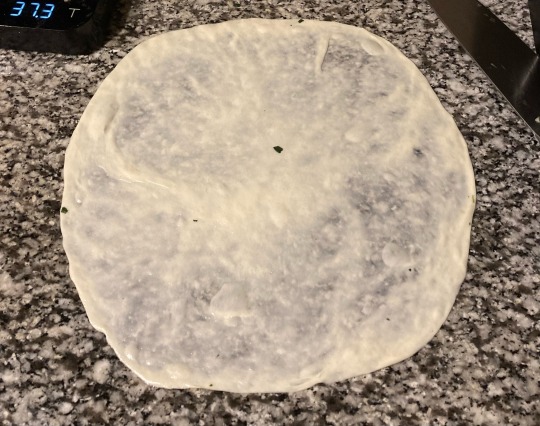
2. Cut the circle in half with a sharp knife. Spread 1/16 of either filling in a thin line along the cut edge, leaving a margin of 1 cm (1/2") or so.
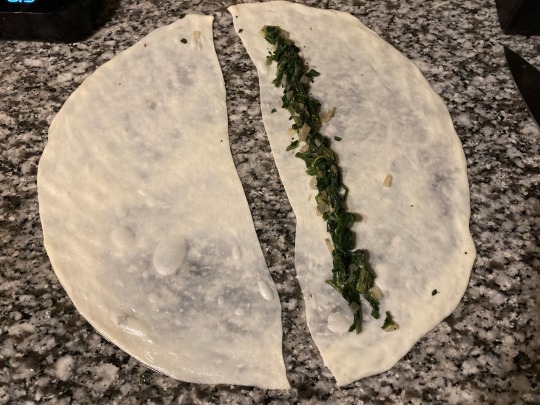
3. Roll the edge of the dough (the cut edge) over to encase the filling. Continue rolling, trying as much as possible to exclude air, until you have a long rope of dough.
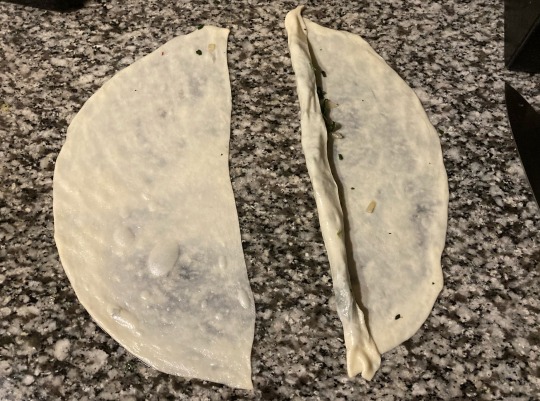
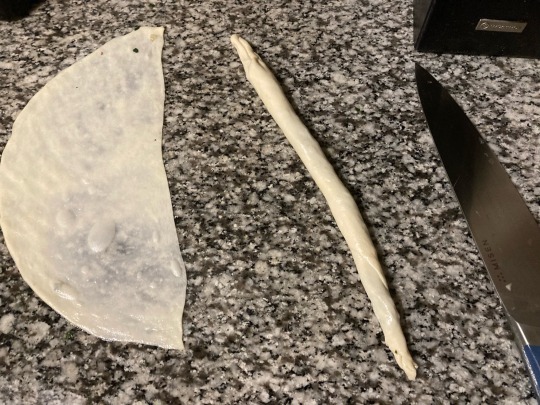
4. Roll the rope around in a tight spiral. Tuck the very end of the dough underneath and press to seal. Place on a preparing baking sheet.
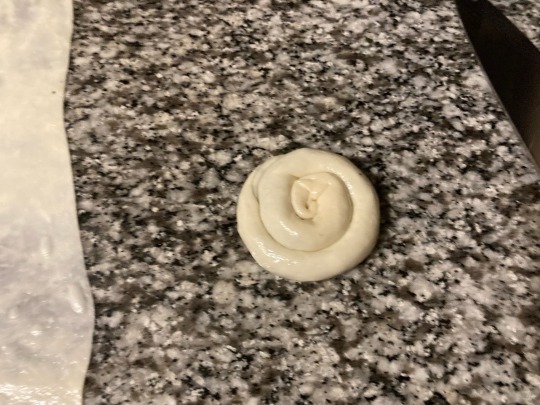
5. Repeat until the filling and dough are used up. Meanwhile, preheat an oven to 375 °F (190 °C). Bake the safiha in the top third of the oven for 25-30 minutes, or until golden in color.
Serve warm with yoghurt.
611 notes
·
View notes
Text
Do understand this too, it’s notable in Palestinian decolonial writing that Israeli settlers would not be expunged (although many would have to relinquish land and resources taken) but the reason for this is not the thought of a biological connection to the land or area but the circumstances in which they exist there which is 1. Often multiple generations down now 2. Many Jewish people were exiled from their countries when the state of Israel was declared, which is to say many people don’t have a country to return to past being part of a stateless ethno religious group, they also cannot return to their country of origin. It’s not about a birth right to land lol
144 notes
·
View notes
Text
academia is often used as the forefront of much of the violence inflicted on palestinians — for example in the library of congress, there is a collection called "the american colony of jerusalem" with racist photography and items that help visually perpetuate the "people without a land, land without a people" part of herzel's ideology, which itself is the forefront of much of zionist ideology. pointing out the systematic harm in academia is often considered "irrelevant" by zionists.... denies the origins of zionism as a political and academic ideology with physical consequences.
much of palestinian history throughout the last century has to do with erasure and silencing — that is how we got to this point. when i say no one listened to palestinians i mean NO ONE listened. they were ignored. all their demands were unreasonable. instead they get blamed for much of the world's unwillingness to listen. even my family members — i have stories of their work in academic resistance since '48. and some of them are well known contributions throughout euro-american and swana society. yet they're still ignored because of their palestinian origin.
"if you were just more reasonable" or "if you took the time to listen with compassion" or "you have to appeal to people's sense of reason" ignores the fact of the matter — this ideology's founding principals were built on "a people without a land for a land without a people." you cannot and should not ignore that. in order to complete the zionist ideology, you must remove the native population. therefore any subscribers to the idea of zionism are violent, whether they intend it or not.
and if it were true, that academia were irrelevant.... then that doesn't explain the systematic torture and imprisonment of writers and scholars, the exile of my family members who were journalists and activists, the captivity of friends for no other reason than they were deemed a threat by some list or the other.
oftentimes zionists, or zionist sympathizers, ignore our (diaspora's) material ties to the occupation and dismiss us as being "disconnected" from the "situation" in Palestine and "misunderstanding" or "misconstruing" israeli society. what am i misunderstanding exactly? that the origins of this "country" relies on violent displacement and exile? that for the past 75 years, that violence has not stopped once? that no matter what we say about the violence of zionism as an intrinsic aspect, it takes a secondary seat to the imagined realities of zionism?
therefore, anti-zionism is the logical conclusion for valuing palestinian lives. but what are the arguments against anti-zionism? that arab governments expelled jews from SWANA? do you think that's a result of anti-zionism? then you must not understand that palestinians are often treated poorly by the same governments that claim to have done this in the name of "anti-zionism," living in poverty in refugee camps, tortured and arrested, even in some cases exiled by governments. this also neglects to mention zionist collaboration with said governments to exile the jews of their lands.
so then, what?
if anti-zionism is the rejection of the settler colonial state of israel, which you must admit to be truly anti-zionist, then it is an exclamation of palestinian sovereignty and identity. so when you say anti-zionism and antisemitism are linked.... do you realize what you are implying? do you realize that zionism, the root cause of palestinian suffering, is the reason for our expulsion and displacement? so then when you write academic thinkpieces about the "complexity" of zionism, do you realize the harm you're doing? do you realize that this, in fact, is not a new or useful argument? that i've seen iterations of it for years and years? that at the core, the zionist ideology relies on this muddying of the waters for you to not do anything?
to be frank, your constant reminding of the complexity of zionism when people in palestine are suffering from the material effects of it only scream, to me, utter contempt and selfishness. zionism is violence, to me and my family. it is violence for every palestinian in this world. you must admit that to be a sincere advocate for palestinians, otherwise your words ring hollow. the present reality outweighs any possibilities.
720 notes
·
View notes
Text
A brief History of Mizrahi Jews in Arabic countries and Their expulsion
A\N: While I am an Ashkenazi Jew, I have done A LOT of research, and have both Iraqi friends and relatives to corroborate this with. Also, I'm petty - an Iraqi user who comments regularly on my posts seems to forget about his own country's Jewish history... Well, I hope he forgot instead of the more likely reality: It seems like Arabic people nowadays aren't aware of Jewish history in their countries since they either killed to expelled them all. Thus is born the constant argument that all Jews originated in Europe and are merely settlers in the Middle East.
I realized that what may be obvious to me won't be obvious to others since I'm a history nerd who grew up in Israel with plenty of rich archeological evidence and resources surrounding me. I'm happy to make these posts in hopes of educating others and contributing my part to ending antisemitism and prejudice. ___________________
You might have seen the following picture in one of my previous posts:
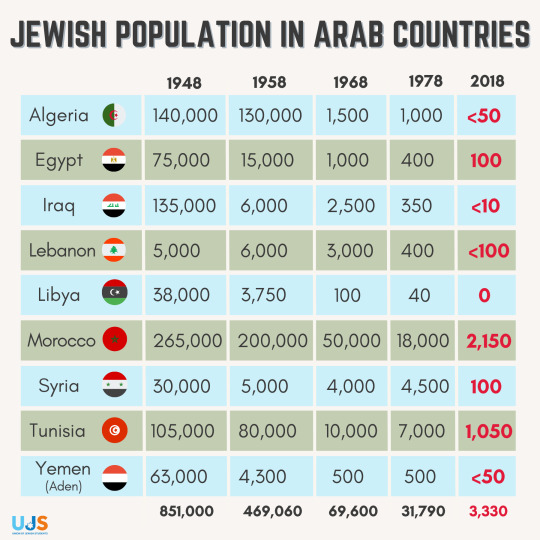
It is said that a picture is worth a thousand words. Unfortunately, in this case, it concludes hundreds of years of discrimination, violence, and exile for Mizrahi Jews. * It is important to note that numbers are slightly varied between sources, but the meaning is clear.
In a nutshell- all throughout history, the fate of Jewish people in countries where they weren't the religious majority was the same:
Discriminatory laws, blood libels, being blamed for disasters > violence & murder > Pogroms * > and eventually- exile or mass murder AKA ethnic cleansing \ genocide.
Pogrom- the term refers to violent attacks by local non-Jewish populations on Jews in the Russian Empire and in other countries.
Every Jewish community has its own Pogrom. While my side of the family might immediately think of the Kristallnacht or persecution & pogroms in Hungary, it is different for Jews from different backgrounds. You can read about a few cases of forced conversion to Islam here.
A brief History of the land of Israel
The land of Israel has always been considered a strategic passageway, and so many empires throughout history have conquered it:
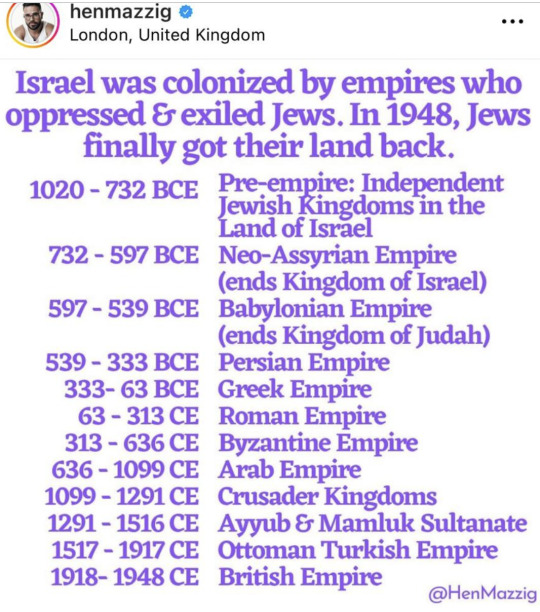
* I simply cannot accurately write 3000+ years of Jewish history in the land of Israel. I found that this video summarizes it perfectly.
Exile from the land of Israel
Jews were exiled from the land of Israel numerous times since the Assyrian empire conquered Israel in 732 BCE, to what we call "the diaspora" גולה. It was not by choice and we were persecuted everywhere we went.
Jews were not allowed to legally return to Israel until 1948 when the British mandate over the land of Israel ended and Israel was formed. Yes, even during the Holocaust.
The Jewish answer to exile - Aliyah עליה There have been 5 waves of illegal immigration from all over the world to the land of Israel before 1948, recorded in modern times.
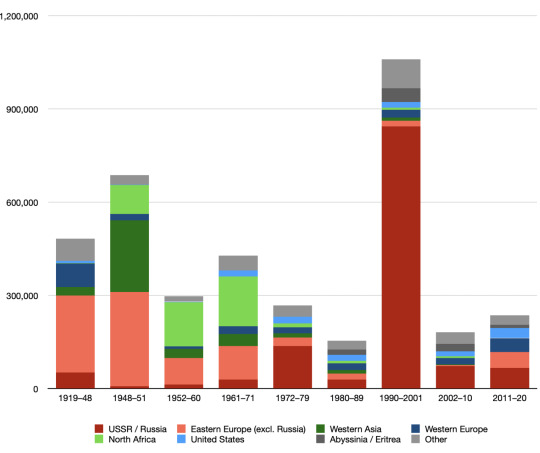
Chart taken from Wikipedia (their chart was the best I could find in English)
Forced Conversion
Whether in conquered Israel or in exile, Jews were often forced to convert to either Christianity or Islam. The choice was between conversion or death.
*You can read more about some of the forced conversion of Jews during history here and here.
First Case study- The last jew of Peki'in, Margalit Zinati
Peki'in is an ancient village in the upper Galilee, Northern Israel. Nowadays, its population is mostly Druze.
Peki'in has had a Jewish presence since the Second Temple period, until Arab riots in the 1930s*. Meet the remaining member of the Zinatis, the only family who returned. (aish.com)
*Read more on the Arab riots of the 1930s here and here. Margalit is currently the last Jew living in the village of Peki'in . She is the last direct descendent of the Zinati Cohen family. The Zinati family's origins are dated back to the Second Temple era. The former Jewish community of Peki'in maintained a presence there since the Second Temple period (516 BCE – 70 CE). That is when the polytheistic Persian Empire conquered the land of Israel. For reference- that was approximately 500 years before Jesus was even born! "During which the Second Temple stood in the city of Jerusalem. It began with the return to Zion and subsequent reconstruction of the Temple in Jerusalem, and ended with the First Jewish–Roman War and the Roman siege of Jerusalem." (Wikipedia)
As an adult, Margalit chose to not marry so she could stay in Peki'in and continue her family's Jewish legacy in Peki'in. She later became in charge of the ancient synagogue in the village and turned her basement into a visiting center \ museum of Jewish history in Peki'in- "House of Zinati". in 2018, she lit up a torch as part of Israel's 70th Independence Day Torch lighting ceremony (which is considered an honor given to influential and trailblazing people).

-Margalit Zinati pictured in the Peki'in Synagogue yard, 2016 Picture taken from Wikipedia, uploaded by Deror Avi.
Second Case study - Iraqi Jews (Babylonian Jews \ יְהוּדִים בָּבְלִים)
Iraqi Jews are one of the oldest documented Jewish communities living in the Middle East. It is estimated that they originated around 600 BC.ת
The Farhud الفرهود הפרהוד
Unfortunately, Iraqi Jewish history ended in the same pattern I've described earlier. The Farhud was the violent mass dispossession against the Jewish population of Baghdad, Iraq between 1-2 June 1941. was the pogrom or the "violent dispossession" that was carried out against the Jewish population of Baghdad, Iraq, on 1–2 June 1941, It immediately followed the British victory in the Anglo-Iraqi War.
Background for the Farhud:
WW2- At the time, many Arabic countries in the Middle East agreed with Nazi ideology.
History of violence towards Jews.
The Anglo-Iraqi War (2–31 May 1941) - caused rising tension, and as usual, it was turned on the Jews.
personal family ties to the Farhud My relative was born in 1939 in Iraq, to a big upper-class Jewish family. Unfortunately, the mass exile of Jews in the 1950s didn't skip her family: she was stripped of her belongings and exiled to Israel along with her family. In the 1950s there were approximately 140,000 Iraqi Jews. As of 2021, there are only 4 left.
----------------- Please feel free to add anything I missed in the notes. And as usual - remember I am a human being. If you cuss or harass me, I will block and report you.
______________
Online Sources: * https://www.israelhayom.co.il/article/865383 - Hebrew article, Title means "Sad ending to a magnificent history: Only 4 Jews left in Iraq".
What was the Farhud https://en.wikipedia.org/wiki/Farhud
History of the Jewish community in Baghdad https://cojs.org/the_jewish_community_in_baghdad_in_the_eighteenth_century-_zvi_yehuda-_nehardea-_babylonian_jewry_heritage_center-_2003/
What are Pogroms?https://encyclopedia.ushmm.org/content/en/article/pogroms?gclid=Cj0KCQiAkeSsBhDUARIsAK3tiedM7DuwIaSQX-kRxvXTgCDxN6-zqeo_DNNFgyanSYGyGOhwu_0vfrkaAg6REALw_wcB
The last Jew of Peki'in, Margalit Zinati https://aish.com/the-last-jew-of-pekiin/
Arab riots of 1930s- https://www.gov.il/en/Departments/General/ben_zvi_30 https://www.jewishvirtuallibrary.org/the-1936-arab-riots
Israel's history from ancient times & timeline : https://www.travelingisrael.com/timeline-land-israel/ https://www.youtube.com/watch?app=desktop&v=iiUIWnU-Ofk
Second Temple era - https://en.wikipedia.org/wiki/Second_Temple_period
Forced conversion of Jews across history- https://www.jstor.org/stable/j.ctt18mvnct.7?seq=4
https://academic.oup.com/book/32113/chapter-abstract/268043723?redirectedFrom=fulltext
#jewish history#middle eastern history#mizrahi jews#israel#israeli#jewblr#jewish#טאמבלר ישראלי#gaza strip#israel palestine conflict#hamas is isis#human rights#ישראל#believe jewish women#judaism#ישראלי#ישראלים#מוזיקה ישראלית#middle east#history#gaza#news on gaza#free gaza#gaza genocide#i/p war#i/p conflict#antisemitism#hamas#jumblr#i/p
415 notes
·
View notes
Text
Scuffed Scavenger
Scuffed Scavenger - More progress in Path of Exile Legacy of Phrecia event as I shift to block base and pick up an elder six-link helm for RF Scavenger.
Hey Folks! Things are starting to come together. Yesterday I made a number of changes to my build that have incrementally moved me towards the indestructible nonsense that is the pinnacle form of Righteous Fire. The next map that I run I will ding level 92 but this morning I dumped a fresh POB to show the state of things. The biggest change is that I managed to pick up a Shaper shield and after…
#arpg#games#Gaming#legacy of phrecia#MMO#MMORPG#path of exile#Righteous Fire#Scavenger#scion#Settlers of Kalguur#Video Games
0 notes
Text
all i can say forever
i'm jewish. as a child i moved from a rural town where my family saw acts of rage and hate, emigrated from a country with a horrifying history with jews. you know the one, though there are many. i'm 31 now and i have seen and experienced antisemitism my whole life, in the many places i've lived, to varying degrees. not that i should need to qualify this before everything i have to say - but i know what that looks and feels like. in my life there have been times at which i have been in danger. i choose to stay out of danger in all the ways i was taught. (part of that is not moving into someone else's house uninvited (more in a sec))
(well-meaning?) people want me to have a relationship with israel. they are very invested in assuming i have some connection to this shifting space, this project. they associate my german jewishness with a place i have never been and never felt. home, for me, is the uncle i haven't seen in too long, the ailing brother of my mother, the same red nose. it's fresh sheets hung over dry summer grass, it's bavarian farmland, it's thick liptauer on pumpernickel bread warmed over the wood stove. it's my grandmother's dining room and rough fenceposts, borders we disrespected as kids. home is also here and there and where my family is, where my friends are, where i've built myself.
in a geopolitical sense, it is clear that the antisemitic position is to sequester jews into a partitioned state conceived of by non-jews after the sunset of our most recent attempted decimation. antisemitic, to tell jews "move here, be at home in this space of constant war. impose war on others. fight for a tenuous link to an ancestry you've never seen or studied." in a religious sense, sort of a key feature of judaism since the second exile is that - we're in exile. this is an orthodox argument, but i have to admit that rabbinical discourse is pretty convincing. the secular establishment of the israeli state in an attempt to accelerate any so-called redemption has left us at a point where i really don't know what hope we have for that to occur. if you believe in god, how can you believe they are looking down at us, impressed
because beyond theoretical or spiritual reasons, the bloodlust, the vengefulness, the racism, the violation of law (i know that laws are agreed upon, are broken all the time by those who grant themselves impunity), the evil of this continuance, the evil which grinds babies and text and memory, gnashes it all in its droning machinery, its cold horror and inhumane (unhuman) practice, seemingly perfected... it is obvious to anyone with a single thought that it is an ethnic cleansing. the forcible "movement" (murder) of people of one group from land people of another group want. is ethnic cleansing. we are watching it in real time, and the world stands by and in many cases, it endorses, it beats and imprisons those who are brave enough to stand up to it, it rewards cowardly men in war rooms who having read fukuyama and arendt and maybe even voegelin conveniently forget themselves, because they can afford to, and wave their hands and make calls and decimate entire families cities sovereignties. and liberalism - that fickle ideology whose sole search is for the justification of atrocity - sends its thoughts and prayers, and emphasizes how just horrible both sides are, and conveniently forgets the histories that have led each "side" to this. convenient.
and i can't do anything about it. i can perfectly articulate every well-thought-out argument, i can cry the most frustrated tears from the well of my chest and i can scream that this isn't right, because it isn't, but nobody fucking cares. those who matter have decided for those who don't.
if you align yourself with israel, or feel any sympathy toward the supposed plight of active settlers (not a neutral spot to be in, by the way - another rational argument), i hope you know how thoroughly you've been manipulated. how successful the project of those with the power to decide we don't matter has been. you and i don't matter. so-called free thinkers meme. you fucking idiot. you genocidal maniac.
not putting this under a cut. fuck you. read it all and remember my jewish name and keep it far out of your mouth the next time you tell someone why the people you've told me are my neighbors deserve a flattening.
476 notes
·
View notes